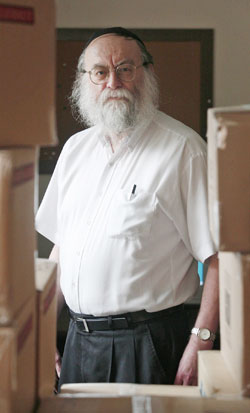Mathematicianís novels reflect his philosophy

Abraham Boyarsky divides his time between numbers and novels when he’s not moving between campuses.
photo by Vincenzo D’Alto
Abraham Boyarsky’s latest novel, The Ratcatcher, is about a man obsessed with helping others.
Alfred, the protagonist, is employed to catch any rats he sees scuttling through an abandoned hotel in Côte des Neiges, but he has secretly permitted dozens of homeless people to live in the building.
A shy bachelor, he becomes intensely involved in their lives. He babysits their children, takes them to medical appointments, plays sports with them on the roof, and exchanges views with them on life and politics.
The people in The Ratcatcher’s fictional hotel reflect the diversity of Montreal, with the exception of the city’s majority French speakers, whom Alfred seems to regard with polite caution. He develops a romantic interest in a Cree woman from northern Quebec, but eventually he marries a Jewish woman. By the end of the novel he has moved to Israel, where he is killed by a sniper’s bullet.
Boyarsky is a longtime mathematics professor at Concordia, but he has a secondary career as a writer of fiction. His previous books were a story collection called The Pyramid of Time, Shreiber, named best first novel in Canada in 1982, The Number Hall, winner of the Toronto Jewish Literary Prize in 1992, and A Gift of Rags, published in 1995.
The Journal interviewed him amid boxes of books and files in Hingston Hall as he reluctantly prepared to join the rest of the Department of Mathematics and Statistics in the downtown library building. Loath to give up the peaceful atmosphere of the Loyola Campus, he held out for a year after his colleagues moved.
The idea of an abandoned hotel came out of Boyarsky’s own involvement with such a building on Décarie Blvd. It became TAV, the Torah and Vocational Institute, a private school for Orthodox Jews affiliated with Collège Marie-Victorin for which Concordia provides some theology courses.
There are other autobiographical echoes in the novel. As Alfred goes about trying to help his neighbours, the shadow of the Holocaust hovers over his life, and with it, the need to expiate an unnamed guilt.
“It’s the guilt of being alive,” Boyarsky said softly. Like the fictional Alfred, Boyarsky came to Canada from Europe after the Second World War, and greatly admired his father, who had vivid memories of the Shoah.
Like Alfred, Boyarsky loves children. He and his wife have 13, six of whom are still at home, and he jokes that his research interest in chaos theory may stem from his domestic situation. “Do you know how many quarrels there can be with that many people?”
He does his writing mainly in the summer, when the family is on vacation in the Laurentians. He says his models are Kafka, Dostoevsky, Turgenev, Tolstoy and Isaac Babel, and writing fiction is easier than doing mathematics. “You can write a paragraph and put it aside for later, but a mathematical theorem, that’s something very different.”
With Pawel Gora, another professor in the department, he published a graduate-level textbook called The Laws of Chaos. The paradox of the title is deliberate.
“Chaos theory is about the small changes that can cause dramatic effects,” he said. “The world is not linear, not continuous. It is discrete.”
Boyarsky admits that his views on mathematics intersect with his religious convictions. “If time is continuous, you can predict the future; this leads to the arrogance of the individual. If time is discrete, non-linear, you cannot predict the future. You can predict only probabilistically, not with certainty.
“Time discreteness is like driving past a fence. The fence posts give the illusion of continuity, but there are spaces between the posts. In time, the posts are the ‘Planck times,’ 10-42 of a second. Between these time posts, time and space cease to exist.”
Boyarsky recently published a paper on the Planck-Einstein Equation that featured a discrete-time interpretation. With it, he calculated that the universe has actually existed only 6,000 years, not the 14 billion years commonly supposed.
While Shreiber was a Holocaust novel that included many of his father’s stories and The Numbers Hall involved math, Boyarsky intended The Ratcatcher for the general reader, and hopes it reaches as wide an audience as the multi-ethnic, multi-generational guests at Alfred’s hotel.